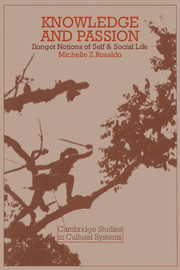Book contents
- Frontmatter
- Contents
- Preface
- Acknowledgments
- 1 The Ilongots
- 2 Knowledge, passion, and the heart
- 3 Knowledge, identity, and order in an egalitarian world
- 4 Horticulture, hunting, and the ‘height’ of men's hearts
- 5 Headhunting: a tale of ‘fathers,’ ‘brothers,’ and ‘sons’
- 6 Negotiating anger: oratory and the knowledge of adults
- 7 Conclusion: Self and social life
- Appendix 1 Ilongot phonology
- Appendix 2 Glossary
- Notes
- Bibliography
- Index
5 - Headhunting: a tale of ‘fathers,’ ‘brothers,’ and ‘sons’
Published online by Cambridge University Press: 05 June 2012
- Frontmatter
- Contents
- Preface
- Acknowledgments
- 1 The Ilongots
- 2 Knowledge, passion, and the heart
- 3 Knowledge, identity, and order in an egalitarian world
- 4 Horticulture, hunting, and the ‘height’ of men's hearts
- 5 Headhunting: a tale of ‘fathers,’ ‘brothers,’ and ‘sons’
- 6 Negotiating anger: oratory and the knowledge of adults
- 7 Conclusion: Self and social life
- Appendix 1 Ilongot phonology
- Appendix 2 Glossary
- Notes
- Bibliography
- Index
Summary
A mutual reticence prevented Ilongots from speaking – and us from asking – about topics we all acknowledge to be threatening to our slow and carefully tended growth of friendship and of trust, and this feeling kept us from raising serious questions about killing until we had completed close to one year in the field. We learned then of songs and ceremony, and gradually, of raids and living feuds, but it was only weeks before our first twenty-one-month field stay ended that we felt we could discuss with Tukbaw a matter that had long been on our minds. What we wondered was, quite simply, how people whom we liked and admired as much as Tukbaw and his companions could be killers; we thought we could understand many things they did and said, but not why people whom we valued for their open ease and generosity found it reasonable and important to take heads.
Tukbaw's answer, as pithy as it then seemed unrevealing and stark, stood for a long time in our reflections as a symbol of the very distance that our question had addressed. To our probing “Why?” he responded with a dull, ‘It is our custom’ – as if acknowledging, or asserting, the limits of our talk. We were all, he told us, children of one God – and we agreed with him. But at some point, he claimed, our paths had separated, our ancestors winding up across the ocean from his own.
- Type
- Chapter
- Information
- Knowledge and Passion , pp. 137 - 176Publisher: Cambridge University PressPrint publication year: 1980
- 2
- Cited by

